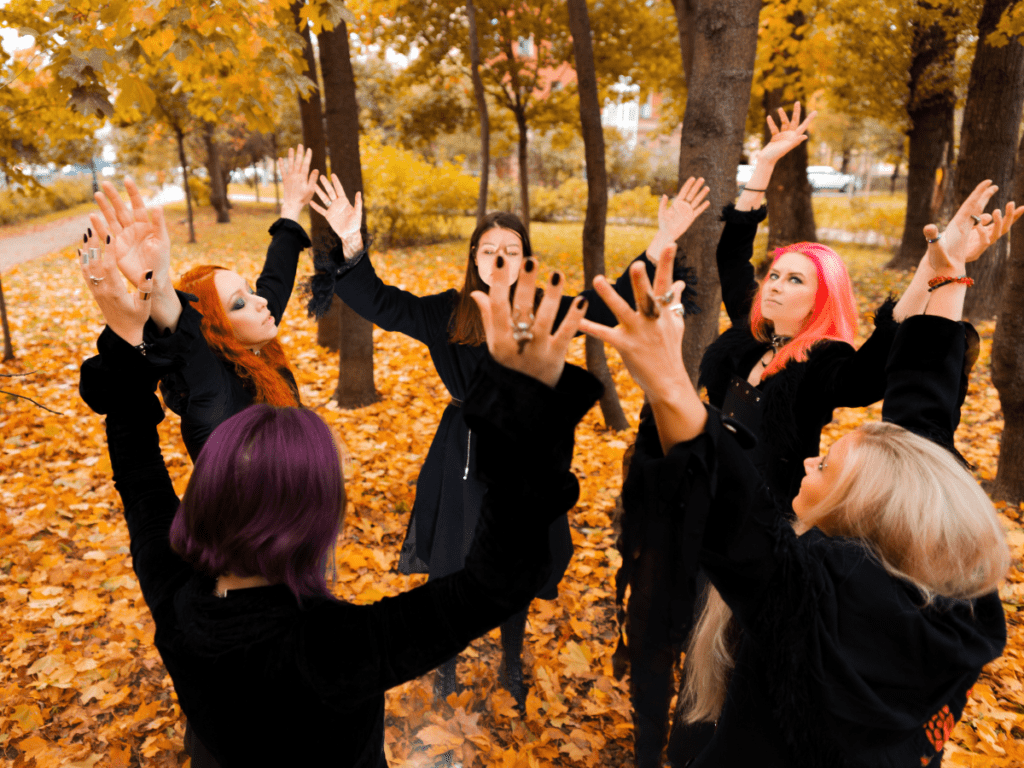Loneliness has popped up on my radar four times in the last month–in the news, on social media, and in a discussion group I attended with some brilliant Witches. So, let’s talk about it. This blog is about the rising rate of loneliness in the U.S. and Australia, theories about why we’re feeling increasingly isolated and lonely, and how we, as Pagans and Witches, can ease loneliness for ourselves and others by cultivating social connection.
The rising tide of loneliness
One out of every two Americans is experiencing loneliness. Last year, The New York Times invited readers to share how loneliness affected their lives. More than 1,400 people responded. The result is The Life Span of Loneliness, a video of people of different ages and backgrounds sharing their struggles.
In May 2023, U.S. Surgeon General Dr. Vivek Murthy issued a Surgeon General’s Advisory about loneliness, calling it an epidemic and public health issue, and proposed a framework to confront it.
It’s worth noting that loneliness is not the same as solitude. Many people enjoy solitude, which can have positive effects, and a person can feel lonely while alone or accompanied. Dr. Murthy defines loneliness as a “subjective distressing experience that results from perceived isolation or inadequate meaningful connections, where inadequate refers to the discrepancy or unmet need between an individual’s preferred and actual experience.”
He says in the Letter from the Surgeon General:
Loneliness is far more than just a bad feeling—it harms both individual and societal health. It is associated with a greater risk of cardiovascular disease, dementia, stroke, depression, anxiety, and premature death. The mortality impact of being socially disconnected is similar to that caused by smoking up to 15 cigarettes a day, and even greater than that associated with obesity and physical inactivity. And the harmful consequences of a society that lacks social connection can be felt in our schools, workplaces, and civic organizations, where performance, productivity, and engagement are diminished.
It may be easy to dismiss loneliness as an American problem. There is a sense that Americans work too much and lack a healthy work-life balance and good health care. But loneliness is on the rise in Australia too, particularly among young people aged 15-24, especially girls and young women, according to a report from the federal government’s Australian Institute of Health and Welfare.
Loneliness and social media
There are several causes of loneliness and theories about why we’re more lonely than ever in the most connected age. The low-hanging fruit that politicians and the media love to point to is digital technology, specifically social media.
The evidence of digital media’s impact on our mental health is complex. The benefits of digital techonology include opportunities for staying in touch with family and friends, increased social participation for people with disabilities, and the possibility of finding community, especially for people from marginalised groups.
Social media may increase loneliness in users who passively consume it in excess. Used passively, social media monopolises our attention, reduces the quality of our interactions, and erodes our self-esteem.
Dr Kate Filia, senior research fellow at youth mental health organisation Orygen, told SBS that social media creates “a sense of sitting there watching the world go by and seeing all these amazing wonderful things happening around them.” The curated nature of online interactions often leads individuals to compare their lives unfavourably with others, fostering a sense of inadequacy and loneliness. Targets of online harassment also experience increased loneliness and isolation.
Loneliness can be situational and cultural and result from the loss of relationships, including death, but not just. When I moved to Australia in 2012, I felt lonely for a long time. I had no friends or a job where I could socialise with co-workers. I didn’t know the city, how to get around, or where to go. I missed my family, friends, community, and home culture. My only meaningful relationship in Melbourne was with my husband, which also put a lot of pressure on him.
All that eased with time as I settled into Melbourne, began to work here, and made friends. The COVID-19 pandemic also made a huge difference. Although the rate of loneliness started to rise before the pandemic, it exacerbated it for many people, especially young people, but it had the opposite effect on me. Because so many organisations and people moved to hosting events online, I was able to connect and reconnect with friends and communities overseas. Again, this highlights the difference between using technology to actively engage with others versus passively consuming digital content.
Loneliness and the disruption of community
When politicians and the media look to digital technology to explain the rising rate of loneliness, they point to the lack of social connection. Dr. Myrtha describes social connection as “the interactions, relationships, roles, and sense of connection individuals, communities, or society may experience.” It’s the number of relationships we have, the variety of those relationships (e.g., family, friend, co-worker, neighbour), the various needs they serve, the quality of the relationships, the frequency of interactions, and so forth.
It’s easy for politicians and the media to point to digital technology because otherwise, they would be forced to reflect on how the modern lifestyle, characterised by increased urbanisation and job mobility (not to mention displacement due to colonisation, war, and other political instability), often results in the disruption of traditional community structures. This leaves individuals without the close-knit support systems that were more prevalent in less transient societies. The decline of social connection has been happening for decades.
Americans value individualism driven by the Protestant work ethic and “pulling yourself up by the bootstraps”. Australians have a stronger sense of solidarity and fellowship captured in the cultural concept of mateship. Still, Aussies are not immune to the pressures of life driven by artificial scarcity and growing economic inequality. The societal emphasis on self-reliance, tackling challenges alone, not seeking help, and prioritising individual success over communal well-being results in exceptionalism, polarisation, selfishness, and a lack of support networks, all fostering isolation.
Alleviating loneliness

The key to alleviating loneliness is to cultivate meaningful connections.
As individuals, we need to seek out and nurture meaningful relationships actively. I’m guilty of not reaching out to people as often and regularly as I would like. I have several friends that I don’t speak with regularly but remain very special to me. However, I almost always say ‘yes’ to a catch-up, try to make myself available, share information and resources, and aim to be a good friend.
We should also remember that meaningful relationships are not limited to living humans. For many of us, everything in the world is inspirited. Cultivating relationships with plants, animals, and the spirit world can also ease our sense of isolation.
Engaging with people of different backgrounds and experiences expands our understanding of the world. Getting involved in your local community by volunteering, joining local groups, or participating in community events can foster a sense of belonging and combat social isolation. So, I also encourage you to get involved in your community with something that isn’t explicitly related to Paganism or Witchcraft. Still, find something that speaks to you, such as joining a park clean-up crew, becoming a beekeeper, or learning a new skill.
When it comes to magickal practice, there are many good reasons why a Witch might be a Solitary and want to stay that way, but I assure you that many Witches are yearning for community. Some are happy to remain online, but many Witches long for a safe, supportive group to learn, share, grow, and belong. Consider what you can do to build community. Is it providing a physical or virtual place for people to come together? Is it teaching or mentoring? It could be introducing people to one another or just being a friend.
Loneliness is a complex issue with far-reaching consequences for well-being and societal health. By fostering a culture of genuine connection, we can work collectively to combat the loneliness epidemic and build and strengthen our communities.

